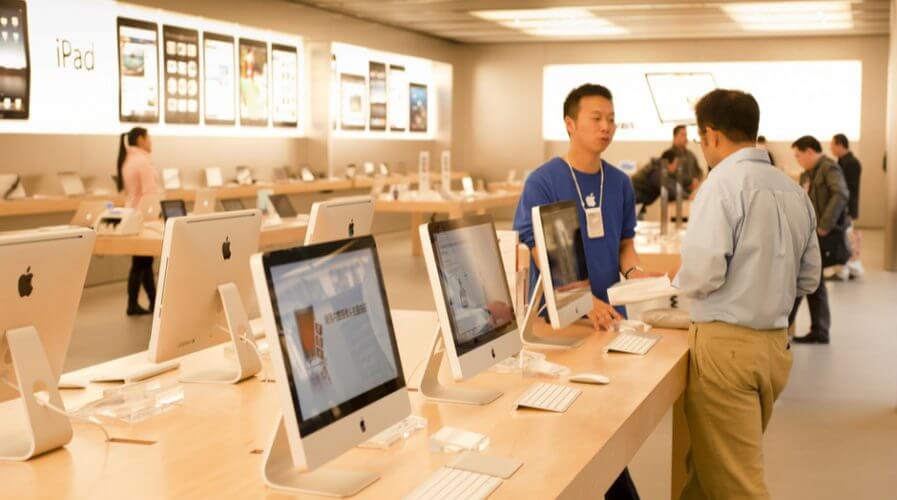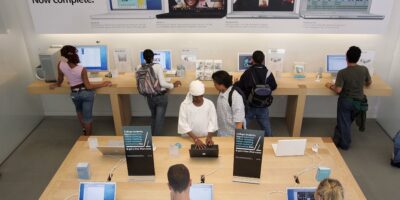
From PC to smartphone: Sales are falling off the cliff as demand slips further.Source: Shutterstock
PC sales falling off the cliff as demand slips further
- The sale of PCs in the third quarter fell nearly 20% YoY, the largest drop in decades and the fourth straight quarter of YoY declines
- The global smartphone market recorded its third consecutive decline this year, dropping 9% YoY, marking the worst Q3 since 2014
In recent months, consumers worldwide have been caught between two minds — to save or to splurge. Despite the eagerness to spend on sorely missed experiences like travel, restaurants and entertainment, pent-up pandemic demand is hitting hurdles in the form of spiking inflation and a looming global recession. The faltering demand is even reflected by the slump in global PC and smartphone sales in the last few quarters.
Most recently, data by global research firm Canalys shows that the global smartphone market has just recorded the worst third quarter since 2014. “In Q3 2022, the global smartphone market recorded its third consecutive decline this year, dropping 9% year-on-year (YoY),” the report reads. Experts from Canalys, like most other experts out there, also reckon that the gloomy economic outlook has led consumers to delay purchasing electronic hardware and prioritize other essential spending.
To top it off, Canalys expects the trend to go on dampening the smartphone market for the next six to nine months. “The smartphone market is highly reactive to consumer demand and vendors are adjusting quickly to the harsh business conditions,” said Canalys analyst Amber Liu said in a statement. She reckons that for most vendors, the priority is to reduce the risk of inventory building up given deteriorating demand.
“Vendors had significant stockpiles going into July, but sell-through gradually improved from September owing to aggressive discounting and promotions. The pricing strategy of new products is cautiously crafted, even for Apple, to avoid significant pushback from consumers who now tend to be very sensitive to any price hike,” added Liu. For context, Samsung retained its leading position with a 22% market share driven by heavy promotions to reduce channel inventory.
On the other hand, Apple was the only vendor in the top five to record positive growth, improving its market position further with an 18% share during the market downturn thanks to relatively resilient demand for iPhones. Xiaomi, OPPO and vivo continued to take a cautious approach to overseas expansion given domestic market uncertainty, retaining 14%, 10% and 9% global market shares, respectively.
Worse PC sales yet
The situation has been even more dire for the global PC market as it witnessed its steepest sales decline in over two decades, during the recent September 2022 quarter. Shipment of desktops and laptops fell 19.5% YoY to a total of 68 million units, according to Gartner’s preliminary quarterly results published recently. It was the steepest market decline since Gartner began tracking the PC market in the mid-1990s and was also the fourth consecutive quarter of year-on-year decline.
The constant decline is mainly due to existing vulnerabilities in the consumer and education segments which are being exacerbated by more cautious IT spending by businesses. Even adverse macroeconomic and industrial factors such as high inflation, rising interest rates and bloated channel inventories have dented the PC market’s momentum — and are likely to persist into 2023.
Gartner’s director analyst Mikako Kitagawa noted that “this quarter’s results could mark a historic slowdown for the PC market. While supply chain disruptions have finally eased, high inventory has now become a major issue given weak PC demand in both the consumer and business markets.” Gartner also concluded that back to school sales ended with disappointing results despite massive promotions and price drops, due to a lack of need as many consumers had purchased new PCs in the last two years.
READ MORE
- Ethical AI: The renewed importance of safeguarding data and customer privacy in Generative AI applications
- How Japan balances AI-driven opportunities with cybersecurity needs
- Deploying SASE: Benchmarking your approach
- Insurance everywhere all at once: the digital transformation of the APAC insurance industry
- Google parent Alphabet eyes HubSpot: A potential acquisition shaping the future of CRM


